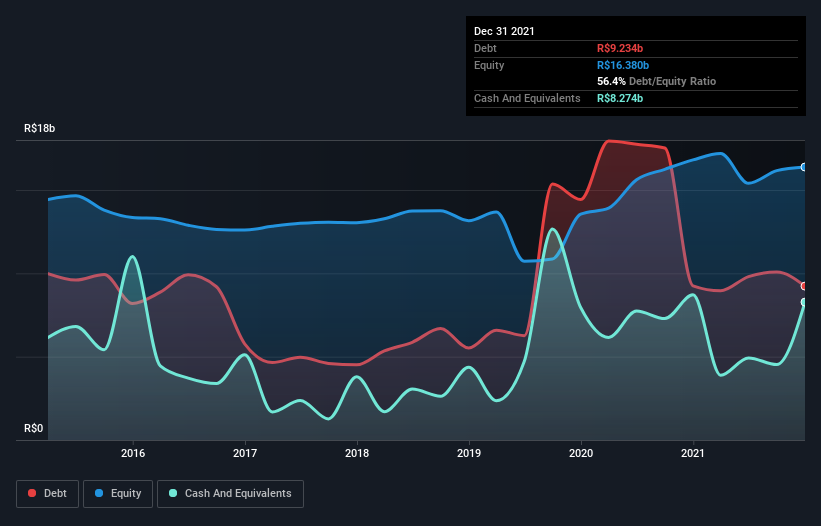- Brazil
- /
- Food and Staples Retail
- /
- BOVESPA:PCAR3
Companhia Brasileira de Distribuição (BVMF:PCAR3) Takes On Some Risk With Its Use Of Debt

Howard Marks put it nicely when he said that, rather than worrying about share price volatility, 'The possibility of permanent loss is the risk I worry about... and every practical investor I know worries about.' It's only natural to consider a company's balance sheet when you examine how risky it is, since debt is often involved when a business collapses. Importantly, Companhia Brasileira de Distribuição (BVMF:PCAR3) does carry debt. But should shareholders be worried about its use of debt?
What Risk Does Debt Bring?
Debt assists a business until the business has trouble paying it off, either with new capital or with free cash flow. Ultimately, if the company can't fulfill its legal obligations to repay debt, shareholders could walk away with nothing. However, a more common (but still painful) scenario is that it has to raise new equity capital at a low price, thus permanently diluting shareholders. Having said that, the most common situation is where a company manages its debt reasonably well - and to its own advantage. When we think about a company's use of debt, we first look at cash and debt together.
Check out our latest analysis for Companhia Brasileira de Distribuição
What Is Companhia Brasileira de Distribuição's Debt?
The chart below, which you can click on for greater detail, shows that Companhia Brasileira de Distribuição had R$9.23b in debt in December 2021; about the same as the year before. However, because it has a cash reserve of R$8.27b, its net debt is less, at about R$960.0m.

A Look At Companhia Brasileira de Distribuição's Liabilities
The latest balance sheet data shows that Companhia Brasileira de Distribuição had liabilities of R$16.6b due within a year, and liabilities of R$16.5b falling due after that. Offsetting these obligations, it had cash of R$8.27b as well as receivables valued at R$2.88b due within 12 months. So it has liabilities totalling R$21.9b more than its cash and near-term receivables, combined.
This deficit casts a shadow over the R$6.68b company, like a colossus towering over mere mortals. So we definitely think shareholders need to watch this one closely. At the end of the day, Companhia Brasileira de Distribuição would probably need a major re-capitalization if its creditors were to demand repayment.
In order to size up a company's debt relative to its earnings, we calculate its net debt divided by its earnings before interest, tax, depreciation, and amortization (EBITDA) and its earnings before interest and tax (EBIT) divided by its interest expense (its interest cover). This way, we consider both the absolute quantum of the debt, as well as the interest rates paid on it.
Companhia Brasileira de Distribuição has a very low debt to EBITDA ratio of 0.31 so it is strange to see weak interest coverage, with last year's EBIT being only 1.8 times the interest expense. So while we're not necessarily alarmed we think that its debt is far from trivial. Unfortunately, Companhia Brasileira de Distribuição saw its EBIT slide 8.3% in the last twelve months. If that earnings trend continues then its debt load will grow heavy like the heart of a polar bear watching its sole cub. The balance sheet is clearly the area to focus on when you are analysing debt. But it is future earnings, more than anything, that will determine Companhia Brasileira de Distribuição's ability to maintain a healthy balance sheet going forward. So if you're focused on the future you can check out this free report showing analyst profit forecasts.
Finally, while the tax-man may adore accounting profits, lenders only accept cold hard cash. So we clearly need to look at whether that EBIT is leading to corresponding free cash flow. Looking at the most recent three years, Companhia Brasileira de Distribuição recorded free cash flow of 42% of its EBIT, which is weaker than we'd expect. That's not great, when it comes to paying down debt.
Our View
On the face of it, Companhia Brasileira de Distribuição's interest cover left us tentative about the stock, and its level of total liabilities was no more enticing than the one empty restaurant on the busiest night of the year. But on the bright side, its net debt to EBITDA is a good sign, and makes us more optimistic. We're quite clear that we consider Companhia Brasileira de Distribuição to be really rather risky, as a result of its balance sheet health. So we're almost as wary of this stock as a hungry kitten is about falling into its owner's fish pond: once bitten, twice shy, as they say. The balance sheet is clearly the area to focus on when you are analysing debt. But ultimately, every company can contain risks that exist outside of the balance sheet. These risks can be hard to spot. Every company has them, and we've spotted 2 warning signs for Companhia Brasileira de Distribuição you should know about.
Of course, if you're the type of investor who prefers buying stocks without the burden of debt, then don't hesitate to discover our exclusive list of net cash growth stocks, today.
New: AI Stock Screener & Alerts
Our new AI Stock Screener scans the market every day to uncover opportunities.
• Dividend Powerhouses (3%+ Yield)
• Undervalued Small Caps with Insider Buying
• High growth Tech and AI Companies
Or build your own from over 50 metrics.
Have feedback on this article? Concerned about the content? Get in touch with us directly. Alternatively, email editorial-team (at) simplywallst.com.
This article by Simply Wall St is general in nature. We provide commentary based on historical data and analyst forecasts only using an unbiased methodology and our articles are not intended to be financial advice. It does not constitute a recommendation to buy or sell any stock, and does not take account of your objectives, or your financial situation. We aim to bring you long-term focused analysis driven by fundamental data. Note that our analysis may not factor in the latest price-sensitive company announcements or qualitative material. Simply Wall St has no position in any stocks mentioned.
About BOVESPA:PCAR3
Companhia Brasileira De Distribuicao
Engages in the operation of supermarkets, specialized stores, and department stores in Brazil.
Good value very low.
Market Insights
Community Narratives




